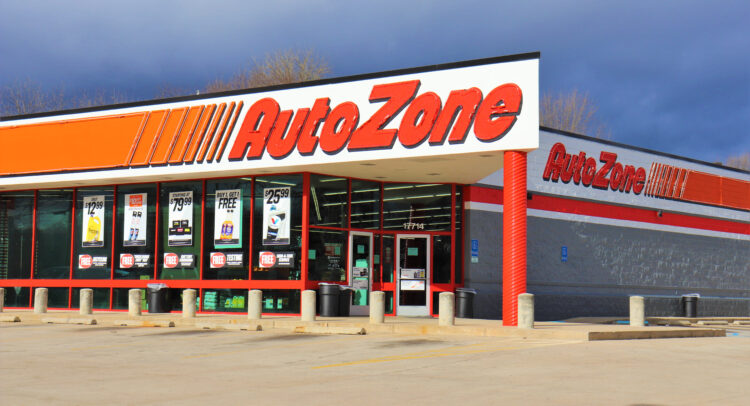Autozone (NYSE:AZO) boasts an unparalleled track record of stock buybacks, having reduced its share count by approximately 89% since 1998. Few companies can claim such an enduring history of share repurchases, and Autozone’s commitment to this strategy has been nothing short of remarkable. Being the premier automotive parts retailer with over 7,000 locations in the Americas, Autozone’s growth and shareholder value creation prospects remain robust. Accordingly, I am bullish on the stock.
Discover the Best Stocks and Maximize Your Portfolio:
- See what stocks are receiving strong buy ratings from top-rated analysts.
- Filter, analyze, and streamline your search for investment opportunities with TipRanks’ Stock Screener.

Understanding AutoZone’s Business Model
To understand why AutoZone can focus so much on its buyback game, let’s break down what makes its business tick. Essentially, AutoZone stands out as a key player in the automotive retail sector, leveraging a multifaceted approach. This includes an extensive network of retail stores, a well-established online presence, and a highly-efficient distribution network.
Tailoring its offerings to cater to DIY (do-it-yourself) enthusiasts and professional mechanics, AutoZone’s stores boast an extensive array of automotive replacement parts, maintenance, and other accessories. The company has earned acclaim for its tireless commitment to customer service, going beyond conventional assistance by providing free vehicle diagnostic services that foster customer loyalty.
However, AutoZone’s most significant advantage lies in its sophisticated distribution infrastructure, ensuring prompt inventory replenishment for physical stores and timely order fulfillment for online purchases. This edge over smaller retailers, often plagued by parts availability issues, is backed by the company’s vast network of 6,316 locations in the U.S. These locations can seamlessly exchange parts, maintaining optimal stock levels across the board.
Despite its seemingly straightforward business model, the company’s strategic brilliance lies in replicating and scaling its proven model by progressively expanding its store footprint. The formula is clear: open new locations, maximize same-store sales, repeat.
While some may argue that with 6,316 domestic locations, growth prospects appear limited, the reality is quite the opposite. AutoZone’s Commercial business division has a market share of just about 4% to 5%, implying ample room for the company to grow in the B2B space.
Moreover, international expansion is on the horizon, with 745 stores already opened in Mexico and 104 in Brazil, while the company plans to accelerate new store openings globally. Management anticipates at least 200 new international stores by 2028, indicating a promising trajectory for sustained growth.
Growth in Financials and the Effect of Buybacks
Now equipped with a comprehensive understanding of Autozone’s business model, let’s look at how it has facilitated consistent financial growth and explore the additional impact of share buybacks on shareholder value creation.
To kick things off with revenue growth, the company has adeptly executed its proven strategy, a point highlighted earlier. The foundation of this growth lies in the continual opening of new stores and the simultaneous rise in same-store sales. For example, in Fiscal Year 2023, AutoZone opened 198 new stores and achieved a 4.6% increase in same-store sales, resulting in a 7.4% overall revenue growth.
The trend persisted into the most recent quarter (Q1 2024), where the company added 25 net new stores and achieved a 3.4% uptick in same-store sales, leading to a respectable 5.1% increase in total sales.
This well-executed strategy has paved the way for robust economies of scale. As same-store sales steadily climb, individual locations experience improved unit economics. Also, opening more stores results in a decline in administrative costs as a percentage of total revenues. Notably, the company’s net income margin has risen from around 10% in Fiscal 2010 to an impressive 14.5% in Fiscal 2023.
While this might not appear to be a massive leap, it has majorly affected the company’s bottom-line growth. In particular, AutoZone has sustained a CAGR (compound annual growth rate) of 6.7% in sales over the past decade. Yet, due to the underlying margin expansion, the net income CAGR stands even higher at an impressive 9.5% over the same period.
Staying true to its predictable growth strategy, AutoZone maintains a lean cash position on its balance sheet. A modest portion of its revenues typically goes toward store openings and other expenditures (CapEx in Fiscal 2023 amounted to 4.6% of revenues), leaving the bulk of its cash to fuel share buybacks.
The asset-light nature of its business model, coupled with the absence of cyclical forces impacting the industry, liberates AutoZone from the burden of holding excess cash, enabling the company to channel its entire free cash flow back to shareholders through strategic buybacks.
A striking testament to the success of this approach is the company’s remarkable reduction in share count by an astounding 89% over the past 26 years—an achievement that few, if any, companies can match. The impact of these buybacks extends beyond mere financial engineering, with EPS growing at an impressive CAGR of 17% over the past decade, considerably outpacing overall earnings growth.
Combining sustained revenue growth, more substantial net income growth due to scaling margins, and even more significant EPS growth due to share buybacks, AutoZone has matured into a compounding machine. Currently, AutoZone’s stock hovers around $2537. Rewind to January 2014 (a decade ago), and the stock was trading at approximately $490. This implies an annualized growth rate of just under 18%, mirroring the remarkable EPS growth.
AutoZone’s market-beating track record is deeply rooted in its unwavering strategy and the substantial volume of share repurchases. Specifically, the stock has risen at a CAGR of about 18% since 1996 (same as last decade’s CAGR), when the company initiated its stock repurchase program, marking an extraordinary and enduring track record of consistent outperformance.
Is AZO Stock a Buy, According to Analysts?
Turning to Wall Street, AutoZone has a Strong Buy consensus rating based on 17 Buys and three Holds assigned in the past three months. At $2,945.16, the average AZO stock price target suggests 16.1% upside potential over the next 12 months.
If you’re wondering which analyst you should follow if you want to buy and sell AZO stock, the most profitable analyst covering the stock (on a one-year timeframe) is Zachary Fadem of Wells Fargo (NYSE:WFC), with an average return of 24.99% per rating and an 87% success rate. Click on the image below to learn more.

The Takeaway
AutoZone’s exceptional commitment to aggressive stock buybacks backed by a robust business model has positioned it as a standout performer in the market. With an 89% reduction in share count since 1998, the company’s shareholder value creation is nothing short of remarkable.
While past performance is not indicative of future returns, given that AutoZone continues to execute its strategy diligently, along with the fact that its international explanation has only now started to pick up, I believe that AutoZone stock will keep delivering strong and potentially market-beating returns, moving forward.









